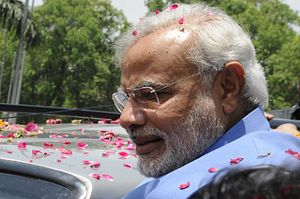India-Pakistan relations have witnessed some positive developments in recent months, including meetings between the two countries’ national security advisors and Indian Prime Minister Narendra Modi’s impromptu stopover at Lahore on his way back from Afghanistan. Certainly the Pathankot attack in January was a setback, although Pakistani Prime Minister Nawaz Sharif ordered an inquiry into the attack and assured India that Pakistan would fully cooperate with its neighbor and leave no stone unturned in finding the culprits.
Unfortunately, this pledge was contradicted a few days ago, in remarks delivered by Pakistan High Commissioner to India Abdul Basit at the Foreign Correspondents club in New Delhi. Basit said that Pakistan would not allow an NIA team to visit Pakistan and investigate Masood Azhar, who heads the Jaish-e-Mohammed and is the main suspect in the Pathankot attacks.
Modi had taken considerable flak from opposition politicians in India, saying that allowing a joint investigation team was a drastic leap of faith given the Pakistani establishment’s record in the past.
And despite his efforts, for his part Sharif simply lacks the political clout and space to take bold measures. In Pakistan, the Army calls the shots. While Sharif is facing political challenges beginning with protests by Tahir-Ul-Qadri, the Zarb-E-Azb operation launched in response to the dastardly attack on the military school in Peshawar has only consolidated the Army’s position.
In fact, Sharif has been undermined by the Pakistani establishment since 2013. In August 2013, five Indian soldiers were beheaded, spiking tensions between the two South Asian countries. This period also saw a sudden escalation in skirmishes along the Line of Control. In September 2013, on the eve of a meeting between Sharif and then Indian Prime Minister Manmohan Singh on the sidelines of the UNGA, a police station and an army camp in Jammu were attacked. Singh then came under fire from the then opposition BJP, which said he should have avoided the meeting.
But what about Modi – does he have the capital to carry out bold initiatives vis-à-vis Pakistan? Modi has now been in power for two years, and faces a considerable challenge to bring about the economic changes he promised. But the issue of Pakistan does receive attention in domestic politics and next year Modi faces some important elections, including one in the all-important state of Uttar Pradesh. A number of analysts, fervent Modi supporters among them, have begun to argue that the current government’s Pakistan policy is no different from that of its predecessor.
A complication is that while Sharif may be well intentioned, diplomacy cannot proceed on mere personal intentions and chemistry between leaders. There is not much sense in engaging with a weakened Pakistani prime minister, whose moves can always be scuttled by an increasingly emboldened Pakistan army.
So what is the best way ahead? Maintaining a minimum level of engagement, such as meeting at the sidelines of multilaterals is never a bad idea, but one should not expect an outcome from every meet. While Singh took leaps of faith in 2006 and 2009, his approach from 2011-2014 where the focus was on improving economic ties was sensible. No political party would object to interactions in the economic sphere, since they help in strengthening segments of Pakistan that are keen for closer economic relations and are wary of China’s growing influence. While the business community in Pakistan may not wield the required clout currently, it could eventually emerge as a strong lobby.
India should not allow its Pakistan policy to be driven by the jingoistic discourse of the electronic media or sections of the strategic community. Instead, New Delhi should pursue basic links that do not harm India’s national interest but that strengthen the civilian government as well as those in favor of better relations. Virtually every Indian leader since Jawaharlal Nehru has sought to normalize ties with Pakistan, and all have been disappointed. The lesson from the past is not to raise the stakes but to realize that this is one area where incrementalism is the best approach.
Tridivesh Singh Maini is a New Delhi based policy analyst associated with The Jindal School of International Affairs Sonipat. He was a SAV Visiting Fellow (January-February 2016) at the Stimson Center, Washington D.C.

































